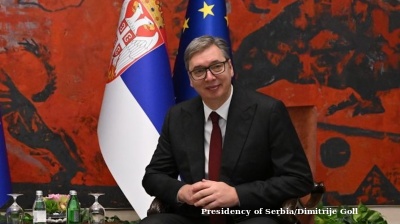Russia has denied that it has defaulted on a $100mn bond payment, with the Ministry of Finance saying that the money had been sent to bond holders, in dollars, in May but it was not the Kremlin’s fault if the cash was not distributed to bondholders.
With a ban on allowing Russia to make international bond payments looming at the end of May, Russia’s Ministry of Finance rushed through the coupon payments on a bond payment that came due on May 27, just days ahead of the deadline.
The US Treasury Department (USTD) Office of Foreign Assets Control (OFAC) allowed a licence that exempted international transfers of dollars to pay off bond obligations to expire on May 25, making it impossible for Russia to meet its debt obligations. Russia has both the resources to make the payments and is willing. The Ministry of Finance says that if the money was not received then that is a force majeure and no fault of its own.
However, the correspondent banks didn’t forward the money to bondholders because of the ban that came into effect only days later and the money was returned to Russia. If more than 25% of bondholders do not receive payment they can trigger a default after a 30-day grace period. That deadline passed on June 26.
Moody’s was the first of the major rating agencies to confirm that Russia is now officially in default of its debt, its first default since 1998.
"On 27 June, holders of Russia's sovereign debt had not received coupon payments on two Eurobonds worth $100mn by the time the 30-calendar-day grace period expired, which we consider an event of default under our definition," a statement from Moody’s said.
Moody’s recalls that this is the third default since February (using a broad definition) on Russian obligations. The first was in March, when the Ministry of Finance froze coupon income (RUB11.2bn) on two OFZ issues for non-residents due to the Central Bank's ban. The second concerns the redemption of rubles of most of the issue of Eurobonds for $2bn with maturity on April 4. According to Moody's classification, this was a default event of the forced exchange type.
The decision by Moody’s triggers the credit default swaps (CDS) insurance on the bonds for those investors that bought CDS cover, although analysts say collecting on the payments will be messy. For those investors that didn’t buy CDS they still have the option to collect their payments in rubles.
Analysts say the case is almost unique as there has never been a default when a country both has the money and is willing to pay. The Russian government intends to challenge the designation of default in court in a case that is likely to run for years.
According to Russian Finance Minister Anton Siluanov, the United States and the European Union are cooking up fictitious obstacles to servicing Russia's foreign debt in order to "put the 'default' label on it.
"These allegations of a default are absolutely unjustified, because back in May, the obligatory payment in the currency was fulfilled, and the fact that Euroclear withheld this money, or did not deliver it to the recipients, is no longer our problem," he told reporters.
The Russian Finance Ministry reported on May 20 that it had made the payment of $71.25mn under Eurobonds maturing in 2026 and of $26.5mn for bonds matruing in 2036. Nevertheless, bondholders did not receive the money by May 27, Bloomberg reported.
The Russian Finance Ministry denies any default. "In accordance with issuing documentation for mentioned issues, the event of default is the failure to pay on the part of the debtor, but the payment was made in advance – on May 20, 2022. In this case, the failure of investors to receive funds occurred through third-party action and not as a result of the failure to pay, which is not expressly provided in issuing documentation and should be considered within the framework of the general norms of law governing conditions of the issue, with consideration of all the circumstances and good faith in the actions of the parties," the Ministry stated as cited by Tass.
The Ministry of Finance is complaining that the West is deliberately trying to block Russia’s attempts to pay its obligations. Russia’s bond paying agent for sovereign Eurobonds maturing in 2023, 2028, 2042 and 2043 had already transferred these payments to Russia’s National Settlement Depository (NDC) in early June. However, none of these payments are likely to go through after the EU added the NDC to the sixth package of sanctions the same month.
Russia has been trying to sidestep the ban on using dollars to pay international debt obligations by introducing the same scheme as the rubles-for-gas deal, whereby Russia sets up two parallel accounts in rubles and dollars so that it can deposit rubles for the payments, which are then converted to dollars and sent on to bondholders.
On June 22, Russian President Vladimir Putin issued an executive order, whereby Moscow views its Eurobond payment obligation as honoured "if they are made in rubles in the amount equivalent to the value of foreign currency commitments" on the day the funds are transferred to the NDC. The first such payment was made on June 23 for Eurobonds maturing in 2027 and 2047. The international community has rejected this scheme.
Bondholders who have not been paid are now free to take Russia to court and to seize Russian assets abroad as compensation. Currently the West has frozen some $300bn of the central bank’s reserves that is an obvious target. However, as the West is not officially at war with Russia, technically these reserves still belong to Russia and cannot be seized by Western governments, but the courts could rule that this money is available to compensate bond investors.
Russia’s last sovereign default occurred in 1998, during the nation’s financial collapse and ruble devaluation. There has been a lot of confusion on when the last default occurred, with some outlets reporting this is the first default on international debt since the Bolsheviks walked out on Russia’s sovereign debt in 1918, following the October revolution.
However, while the bulk of the default during the 1998 crisis was domestic GKOs (the precursor to the Russian Finance Ministry’s OFZ treasury bills), there was some dollar-denominated debt issued by state-owned Vnesheconombank included in that restructuring. In addition, Russia restructured some of its Soviet era debt in 1997 held by Western banks included in the so-called London Club debt.
That was technically the obligation of Vnesheconombank rather than the Russian Federation, which was at the time the official payment agent of the state. Vnesheconombank (now known as VEB and re-tasked as the state development bank) had a special status at the time, as it is not part of the banking sector, nor under the supervision of the Central Bank of Russia (CBR), but has the status of bank due to a special presidential decree. It was the official payment agent for Russia’s international debt, but under the leadership of Andrei Kostin, now the CEO of VTB Bank, increasingly carried out commercial banking operations. Since then the bank has been re-tasked again under Igor Shuvalov and is in charge of major infrastructure investments that make up a third of the 12 National Projects investment plan.
In May 1999 the government also defaulted on a Soviet-era dollar bond, known as the MinFin III that was domestically issued, but was widely held by foreign investors.
According to Lee Buchheit and Elena Daly, sovereign debt lawyers who provided advice to Russia during its 1990s restructuring, while the country did restructure some of its debt then, that didn’t include its Eurobonds at the time, Bloomberg reports. “MinFins, while denominated in dollars, were governed by Russian law and therefore could be viewed as internal debt,” they said.
Including all these episodes, this is the third time Russia has defaulted on its international debt.
Finance Minister Anton Siluanov dismissed the situation on Thursday as a “farce.” He also said it makes little sense for creditors to seek a declaration of default through the courts because Russia hasn’t waived its sovereign immunity, and no foreign court would have jurisdiction.
“If we ultimately get to the point where diplomatic assets are claimed, then this is tantamount to severing diplomatic ties and entering into direct conflict,” he said. “And this would put us in a different world with completely different rules. We would have to react differently in this case – and not through legal channels.”
Symbolic default
Analysts say that the default is largely symbolic and will have little impact on the Russian economy in the short term in contrast to the 1998 default that sent the Russian economy into a tailspin and that then took years for it to recover from. In 1998 the government ran out of money, whereas this time round the government is reporting its largest ever current account surplus after receiving over €100bn in oil export revenues since the start of the war with Ukraine in February.
“Russia’s government has now reportedly defaulted on its foreign-currency denominated debt for the first time since 1918, but this is a largely symbolic event that is unlikely to have an additional macroeconomic impact. Sanctions have already done the damage and locked Russia out of global capital markets,” said Liam Peach, an emerging market economist with Capital Economics, in a note.
“A default is significant insofar as it shows the effectiveness of the Western sanctions regime against Russia, but is not a big deal for Russia’s economy,” Peach adds. “The cost of default for a sovereign is being locked out of global capital markets or the prospect of a prolonged period of high borrowing costs. Russia had been in default for more or less three months as far as bond investors were concerned.”
Sanctions have already prevented the government from accessing capital markets, where it typically borrows some $3bn a year on the Eurobond market and raises several tens of billions of dollars equivalent on the domestic OFZ market. Now US investors are prohibited from purchasing any Russian government debt and the government has halted all new issuance.
With the state currently running a budget surplus of RUB1.6 trillion in the first quarter the Ministry of Finance has no need of foreign investors, but with the economy expected to contract by 8%-15% this year, funding the budget may become an issue next year.
Russia’s budget surplus for January-May 2022 amounted to RUB1.495 trillion, according to the preliminary estimate of the Ministry of Finance released in June. Data for May is classified. In April, a monthly budget deficit was recorded for the first time.
The volume of all revenues for the five months of this year reached RUB12.043 trillion (oil and gas revenues amounted to RUB5.658 trillion, and non-oil and gas was RUB6.385 trillion), reports the Bank of Finland institute for Emerging Economies (BOFIT). The volume of expenditures for January-May reached RUB10.5 trillion.
“Russia was an infrequent debt issuer on international markets anyway and the outstanding value of its FX bonds amounts to $37bn; comparable to Chile and the Philippines, whose economies are 80% smaller,” says Peach.
However, Russian President Vladimir Putin has made it clear that he values Russia’s reputation on the international bond markets. When he first took office in 2000, then German Chancellor Gerhart Schroeder offered to restructure Russia’s London Club debt, but Putin refused, saying that a country of Russia’s significance should honour all its debt, and the London Club debt was paid off despite Russia’s dire financial standing at the time.
The pressure from the default on Russia’s ability to raise money on capital markets could take several years to bite as the Ministry of Finance can rely on domestic banks to buy OFZ for the meantime. During the worst turbulence at the end of last year after tensions with the West appeared, the domestic banks stepped in and bought most of the OFZ issued by the Ministry and still have sufficient liquidity to continue doing this for the foreseeable future. Putin has been building Russia’s Fiscal Fortress for over a decade, as bne IntelliNews reported over a year ago, and it remains very robust.
The spillover to the rest of the world from Russia’s default should also be limited, says Capital Economics.
“A default is clearly a big deal for those investors that hold Russian Eurobonds (and are therefore due interest) as well as those that have taken out protection in the event of a default (the settlement process for CDS contracts could get messy). But only around half of Eurobonds are held by non-residents ($19bn) and the government will continue to service those debts in which ruble payment is allowed in the contract ($11bn in total by our estimates),” Peach adds.
That means that unlike the 1998 default, where the foreign holdings of GKO was worth some $40bn, this time round only about $8bn of foreign held bonds will be directly affected by this default.
News

IOC sanctions Indonesia over Israel visa ban
The International Olympic Committee has announced that international sports federations will be advised not to hold competitions or meetings in Indonesia after the country barred Israeli athletes from entering.

Serbian president accuses EU of backing “colour revolution” after European Parliament adopts harsh new resolution
MEPs back the toughest rebuke yet from Brussels towards Serbia in over a decade of EU candidacy.

Asian carrot smuggling ring busted in the Philippines
The cargo, consigned to Fourth Consumer Goods Trading, contained more than 53,000 kilograms of carrots that were already beginning to rot.

India, US near major trade deal cutting tariffs to 15–16% if New Delhi will limit Russian crude imports
India and the United States are close to finalising a long-awaited bilateral trade deal that could sharply lower tariffs on Indian exports to about 15–16% from the current average of 50%


